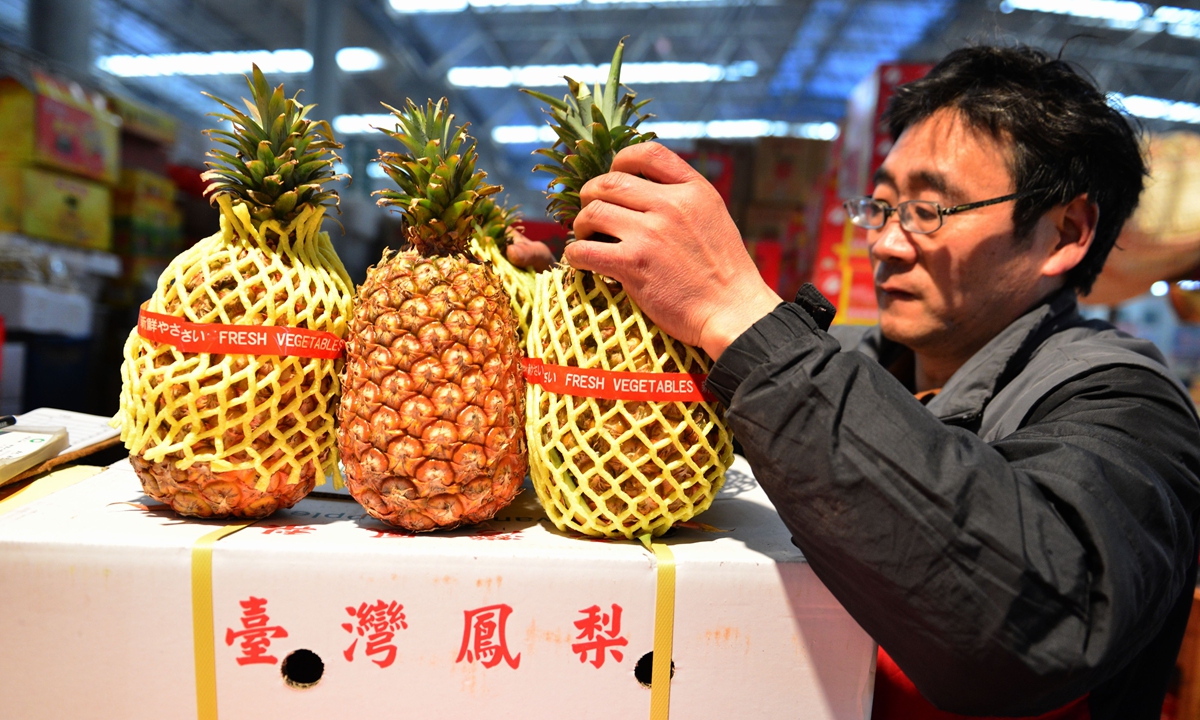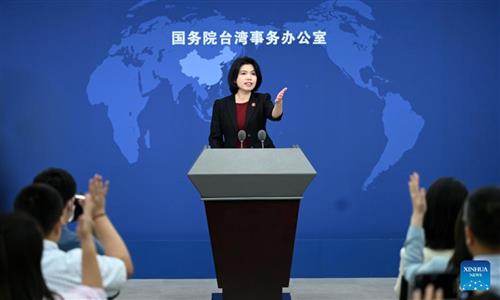Chinese mainland ends tariff concessions on 134 Taiwan imports, as DPP undermines cross-Straits trade

Taiwan pineapple in a supermarket in Yiwu, East China's Zhejiang Province Photo: VCG
The Chinese mainland will suspend tariff concessions on 134 import items from the island of Taiwan starting in mid-June, and the Democratic Progressive Party (DPP) authorities bear full responsibility for the move, as it has long imposed unilateral trade restrictions on mainland exports, mainland authorities said on Friday.
The move comes as the DPP authorities also continue to push for "Taiwan independence," which has seriously undermined cross-Straits relations and the basis for cross-Straits economic and trade cooperation. While the mainland takes firm steps against the DPP's secessionist acts, it will also continue to support Taiwan businesses and compatriots through concrete measures, mainland officials and experts said.
In a notice on Friday, the Customs Tariff Commission of the State Council announced that starting on June 15, preferential tariff rates for 134 items imported from Taiwan stipulated in the Economic Cooperation Framework Agreement (ECFA), including a slew of chemical products and machines, will be terminated. The move is in line with regulations and procedures under the ECFA, the notice said.
"The Taiwan region has unilaterally imposed discriminatory bans, restrictions and other measures on mainland exports, in violation of the provisions of the ECFA," the commission said, adding that after the mainland terminated certain preferential tariff rates under the ECFA in December, "the Taiwan region has still not taken any effective measures to lift trade restrictions on the mainland."
On December 21, the commission announced the suspension of tariff concessions for 12 kinds of products, including propylene, imported from Taiwan starting from January 1, 2024, in response to the DPP authorities' discriminatory trade actions against mainland products.
In a statement on Friday, a spokesperson for the Ministry of Commerce (MOFCOM) said that Taiwan authorities have long unilaterally imposed discriminatory restrictions against the mainland, violating provisions of the ECFA that stipulated the gradual reduction or elimination of tariffs and other trade barriers on the majority of merchandise trade, which harms not only the interests of enterprises, but also the well-being of compatriots on both sides of the Straits.
After the mainland announced the suspension of 12 tariff items in December, the DPP authorities not only did not take steps to remove trade restrictions, but instead wantonly promoted the "Taiwan independence" secessionism fallacy, incited cross-Straits confrontation, and undermined the basis for the implementation of the ECFA, the MOFCOM spokesperson pointed out.
"As a result, relevant mainland departments had to further suspend tariff concessions for some products under the ECFA," the spokesperson said, "the relevant responsibility lies entirely with the DPP authorities."
While the Taiwan region has benefited enormously from the ECFA, which was signed in June 2010 based on the 1992 Consensus, which embodies the one-China principle, the DPP authorities banned the import of more than 2,500 Chinese mainland products as of November 2023, according to MOFCOM.
Countering secessionism
In addition to the discriminatory trade bans and restrictions, the DPP's secessionist words and deeds also warrant firm countermeasures from the mainland, experts said.
"The ECFA is based on the 1992 Consensus. Since the DPP authorities refuse to recognize the 1992 Consensus, the basis for the implementation of the ECFA in fact no longer exists," Zhang Wensheng, deputy dean of the Taiwan Research Institute at Xiamen University, told the Global Times on Friday, noting that the mainland's move is only natural, given the DPP authorities' recent secessionist rhetoric.
During his so-called inaugural speech on May 20, Taiwan's regional leader Lai Ching-te blatantly referred to the island as a "nation," talked about the island's political system and "freedom," and hyped so-called political and military "intimidation" from the mainland. Meanwhile, the US has also sought political manipulation from the Taiwan question, with US Secretary of State Antony Blinken congratulating Lai.
Lai's separatist rhetoric and the US' interference have been harshly criticized by Chinese officials. "The pursuit of 'Taiwan independence' is a dead end. External interference in China's internal affairs and encouragement and support for 'Taiwan independence' will lead nowhere," Wang Wenbin, a spokesperson for the Ministry of Foreign Affairs, said on May 20.
In a statement on Friday, Chen Binhua, a spokesperson for the State Council Taiwan Affairs Office, also said the DPP authorities should bear the responsibility for the preferential tariff suspension and warned against any secessionist moves.
"Facts have once again proved that pursuing 'Taiwan independence' will lead to no peace and no development. It will only bring disaster and harm to Taiwan, and will only harm the interests of Taiwan's enterprises and residents," Chen said.
Chinese officials and authorities have also made it clear that the moves are targeted at the DPP authorities' words and deeds, and not aimed at undermining the interests of Taiwan businesses and the well-being of Taiwan compatriots.
"We have always respected, cared for, and benefited our Taiwan compatriots. We have always taken a positive attitude toward promoting cross-Straits economic exchanges and cooperation. We will, as always, welcome and support Taiwan compatriots and companies to invest and develop in the mainland," Chen said.
Experts said that as the Chinese mainland continues to take countermeasures against the DPP authorities' separatist acts, it will also continue to make efforts to support cross-Straits cooperation.
"While taking countermeasures, the Chinese mainland will also promote cross-Straits economic and trade cooperation, so as to prevent the DPP authorities from seeking to decouple or disrupt ties," Wang Jianmin, a senior cross-Straits expert at Minnan Normal University in Fujian, told the Global Times on Friday.
The Chinese mainland has taken major policy steps to boost cross-Straits cooperation. In January, mainland authorities released sweeping guidelines to support East China's Fujian Province in exploring new paths for cross-Straits integrated development, outlining a flurry of specific measures to boost economic and trade cooperation between Fujian and Taiwan region.
The new measures have been widely hailed by Taiwan entrepreneurs as concrete steps to help businesses from the island further explore and expand in the mainland market.




